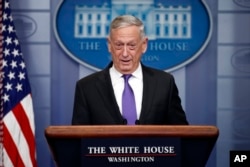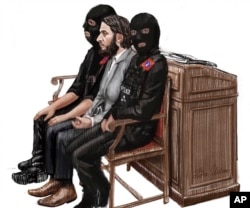French officials remain adamant they won’t accept the repatriation of French jihadists after their capture on the battlefields of Syria and Iraq for prosecution in France.
After almost a week of intense discussions between Western governments on the fate of foreign fighters detained in the Levant, U.S. appeals for their countries of origin to accept responsibility for them are still being rejected by the French and British governments.
“We are no nearer an overall agreement on this,” a senior French diplomat told VOA.
He says Paris fears repatriated foreign fighters will try to use the courts for propaganda purposes by mocking French justice and questioning its impartiality and that once in jail they will seek to radicalize prisoners. The legal issues also are complex for prosecuting French jihadists for terrorism committed overseas, say French officials.
“Prosecutions are going to be difficult because the collection of evidence may well be impossible to secure on the battlefields,” said the French diplomat, who has been involved in high-level discussions on the issue with American and European counterparts
French citizens are estimated to be among the biggest contingent of overseas fighters who joined the Islamic State terror group and other jihadist factions in the Levant. More than 300 French jihadists are thought to have died fighting in Syria or Iraq, leaving an estimated 500 to 600 unaccounted for or detained mainly in Syria by the Kurds.
Midweek U.S. Secretary of Defense Jim Mattis addressed the question of what to do with “hundreds” of foreign jihadists currently in detention in northern Syria. Most were detained following the fall of Raqqa, the de facto capital of Islamic State, to U.S. backed Kurdish-led Syrian Democratic Forces.
The U.S. fears there’s always the risk jihadists detained by the SDF could escape amid fighting in Syria.
“The bottom line is, we don’t want [the jihadists] to go back on the streets of Ankara, Tunis, Paris or Brussels,” said Mattis following the meeting with 13 of his international counterparts in Rome. “It is an international problem, it needs to be addressed by all engaged."
What to do with foreign fighters quickly became the focus of the midweek Rome summit, sparked partly by the news of the capture by the Syrian Kurds of two Britons, Alexanda Amon Kotey and El Shafee el-Sheikh — alleged members of a jihadist gang nicknamed “The Beatles” who tortured and beheaded 21 foreign hostages. Among the hostages were American and British journalists and aid workers, and the first of their victims was American journalist James Foley.
Both France, and Britain, have remained unmoved by Mattis’ appeal for the countries of origin to accept responsibility for captured jihadists. French officials say recent terrorism trials in France and Belgium highlight the dangers, with jihadists using court proceedings as best they can for propaganda purposes.
They don’t want to add to the dozens of prosecutions of jihadists already underway by supplementing them with trials of the foreign fighters, who, they say, can be dealt with in situ by those detaining them, even in Kurdish-controlled northern Syria, which has no internationally recognized government or legal system.
The French officials point to the ongoing trial in Belgium of Salah Abdeslam, who is accused of carrying out terrorist attacks in Paris in 2015 and Brussels in 2016, as an example of how jihadists are seeking to feed the suspicion among some French Muslims that the judiciary system is rigged against them.
On the the first day of his trial, Abdeslam mocked the court, staging an act of political defiance. He said he would defend himself by remaining silent. “What I observe is that Muslims are judged, treated in the worst of ways,” he said. “They are judged mercilessly. There is no presumption of innocence, there is nothing, we’re immediately guilty, voilà. My silence does not mean that I am guilty.”
Last month, the country’s justice minister, Nicole Belloubet, told media outlets that Paris “will intervene” if French nationals are sentenced to death in Iraq or Syria for belonging to Islamic State or other jihadist groups. She said France would “negotiate with the state in question … on a case-by-case basis.”
Her remarks came after an Iraqi court sentenced a German woman to death after finding her guilty of being an IS member. But Belloubet has stressed that France has no legal problem with captured French jihadists facing justice in courts in the self-declared Kurdish autonomous region of northern Syria, known as Rojava. She said last month in a radio interview that she didn’t see a problem as long as the French nationals accused of terrorism were guaranteed access to a lawyer and consular services.
Syrian Kurds greeted her remarks as giving Rojava de facto diplomatic recognition.
British officials also have been unmoved by appeals to repatriate and prosecute British jihadists captured in Syria. Britain’s Defense Minister Gavin Williamson has said the two remaining members of “The Beatles” should never again set foot in Britain.






